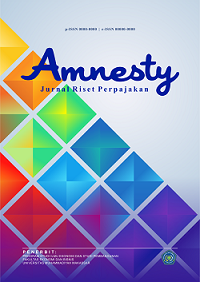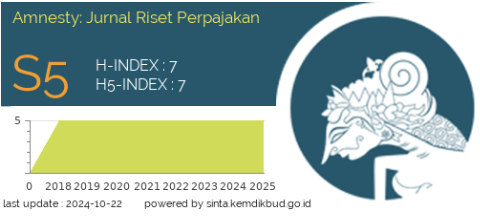Implementation of Tax Planning at PT Mayora Indah
DOI: https://doi.org/10.26618/jrp.v7i1.13976
implementation, Tax planning, Mayora Indah
Abstract
This research investigates the implementation of tax planning at PT. Mayora Indah, a prominent food production company in Indonesia. The study employs a descriptive data analysis method to assess tax planning using the fixed asset depreciation method, focusing on financial reports from 2021 to 2022. The primary objective is to analyze the impact of different depreciation methods on income tax payments. In the introduction, the significance of tax planning is highlighted as a crucial aspect of organizational management, emphasizing the need to comply with tax regulations while minimizing tax liabilities. The study specifically delves into the tax planning strategy related to fixed asset depreciation methods, examining their implications on tax obligations. The literature review covers essential concepts such as tax planning, influencing factors in taxpayer behavior, and various tax planning strategies, including tax saving, tax avoidance, and optimizing allowable tax credits. It also discusses the classification and depreciation of fixed assets in taxation, outlining different groups and depreciation rates. The research methodology is comparative, employing descriptive methods to analyze the implementation of tax planning at PT. Mayora Indah. The results of the analysis indicate that the straight-line depreciation method results in higher taxes compared to the declining balance method for the years 2021 and 2022. The company profile provides an overview of PT. Mayora Indah, emphasizing its market presence, vision, and mission. The analysis of the results of tax implementation using the depreciation method includes income calculations, depreciation expenses, taxable business profits, and income tax calculations for both straight-line and declining balance methods. The conclusion highlights that the declining balance method yields smaller taxes compared to the straight-line method, demonstrating the effectiveness of tax planning through fixed asset depreciation. The study suggests that PT. Mayora Indah can achieve significant cost savings by implementing the declining balance method in its tax planning strategy.References
Adil, M. (2022). Accountability and Transparency in the Public and Private Sector. International Journal Of Humanities Education and Social Sciences (IJHESS), 1(6).
Adiningrat, A. A., Ruhayu, Y., Rustan, R., Wahyuni, S., & Fitrianti, A. N. (2022). The Effect of Financial Literature and Islamic Work Motivation on the Performance of Food Micro, Small and Business Enterprises (MSMEs) in Makassar City. Budapest International Research and Critics Institute-Journal (BIRCI-Journal), 5(4), 30836-30845.
Adiningrat, A. A., & Warda, W. (2023). The Development of Intensity Model on Technopreneurship to Improve Turnover in Micro, Small and Medium Enterprises (MSMEs) Culinary in Makassar, Indonesia. International Journal of Economics Development Research (IJEDR), 4(2), 218-228.
Arsal, M. (2021). Impact of earnings per share and dividend per share on firm value. ATESTASI: Jurnal Ilmiah Akuntansi, 4(1), 11-18.
Arsal, M., & Arsal, D. (2019, August). Urban forest and financial resources perspective in Indonesia. In IOP Conference Series: Materials Science and Engineering (Vol. 593, No. 1, p. 012006). IOP Publishing.
Arsal, M., HAMID, N. I. N. B. A., Arsal, R., & Basri, M. (2014). Consumer Behavior of the Islamic banking. International Journal of Science Commerce and Humanities, 59-64.
Arman, A. (2021). Analysis of Motor Vehicle Tax Revenues before and after the Tax Kring. Point of View Research Accounting and Auditing, 2(2), 144-149.
Arman, A., & Mira, M. (2021). Does Tax Avoidance Make Do Earning Opacity?. Atestasi: Jurnal Ilmiah Akuntansi, 4(1), 88-95.
Arman, A., Mira, M., Masrullah, M., Agustan, A., Firmansyah, F., & Aditya, R. (2023). Financial Literacy and Assistance in Compiling Independent Financial Reports Using Expense IQ Money Manager. Technium Sustainability, 4, 7-12.
Arniati, A., Arsal, M., Akhmad, A., Asdar, A., & Adiningrat, A. A. (2020). Impression of Student Knowledge on Decisions Become a Customer of Islamic Banks.
Hutagaluh, O., Rustam, A., Sangadji, S. S., Baharuddin, I., & Kurniullah, A. Z. (2020). Responsive Leadership in Preventing Transmission of Covid-19 in the Indonesia-Malaysia Border Area.
RUM, M., ARSAL, M., KHALID, A., & AWALUDDIN, M. (2023). The Distribution of Tax Collectability, Quality of Tax Services Efforts to Tax Coverage Ratio.
Rustan, R., Adiningrat, A. A., & Aisyah, S. (2023). Optimizing of Resources Utilization Through Islamic Spiritual Entrepreneurship to Improve The Welfare of Coastal Communities.
Rustan, S. A., Aisyah, S., Adiningrat, A. A., Rustam, A., & Anggoro, M. Y. A. R. (2022). Strengthening Of Marketing Information Systems and Accounting Information Systems for Micro Small and Medium Enterprises (UMKM) Food Culinary Makassar.
Suarni, A., & Amelia, R. (2023). Analysis of Mosque Financial Management in Ujung Bulu District, Bulukumba Regency, South Sulawesi, Indonesia. Public Sector Management and Accounting Research, 2(2), 10-22.




